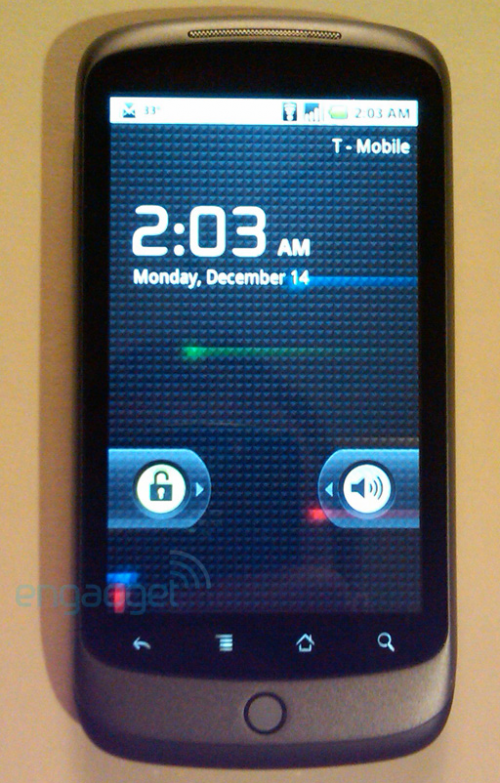Putting The Google Phone (Nexus One) Into Some Perspective
As everyone knows by now the weekend saw an explosion of interest, speculation and posting around the “Nexus One,” the so-called “Google Phone” predicted first in an article by TheStreet in October and then further exposed by TechCrunch. I wrote two posts this weekend as the story evolved: More Detail On Google Phone From A […]
As everyone knows by now the weekend saw an explosion of interest, speculation and posting around the “Nexus One,” the so-called “Google Phone” predicted first in an article by TheStreet in October and then further exposed by TechCrunch. I wrote two posts this weekend as the story evolved:
- More Detail On Google Phone From A User; Makes Droid “So Last Month”
- The “Google Phone” Now At Large?
Let’s step back a bit, now that it’s Monday, and see where we are.
Rather than “the” Google Phone, this is “another” Android phone but with apparently more intense Google involvement. Google has reportedly gone beyond the level of hand holding and input it had with Verizon and Motorola on Droid and specified everything on this device. HTC built the handset. HTC was the hardware OEM that manufactured the G1 the original “Google Phone.”
Beyond the fact that it’s supposed to be a fabulous phone and that it’s running Android 2.1 (Droid has 2.0), this phone will not be sold through a carrier. That’s the single really big development here. It will be sold online directly to end users.
I would imagine we’ll see it made available through several outlets eventually. The question is: how hard will Google push it directly on Google’s own site(s) or a separate site with Google branding?
I spoke a good deal this weekend about how price will be a major factor in the success (or lack thereof) of this phone and speculated about Google’s strategy in this regard. Peter Kafka of AllThingsD has some additional detail about this angle and T-Mobile’s apparent involvement:
But, for sure, Google doesn’t intend to sell its new “Nexus One” phone the typical way, sources familiar with the company’s plans say. Instead, it envisions a scenario where customers who buy the handset on a separate Web site are then provided with another list that lets them pick a carrier, menu-style.
Google (GOOG) has approached multiple carriers about supporting its new phone, which it has designed itself and will be produced by Taiwan’s HTC, offering this selling scenario, sources say.
HTC, by the way, built the T-Mobile’s G1 phone, the first Android-powered one.
But, so far, only T-Mobile has agreed to consider it and actively help push the phone via various distribution channels and support infrastructure, I’m told.
The “Nexus One” has already been cleared by the FCC and it’s a GSM handset. While GSM is the dominant standard outside the US — the iPhone is GSM — only T-Mobile and AT&T are GSM carriers among the big four in the US market. This phone won’t work on Sprint or Verizon’s networks accordingly.
T-Mobile is reportedly considering some sort of discount on service (with a two-year contract) that would amount to a kind of rebate or after-the-fact subsidy to effectively bring the phone’s price down. (The T-Mobile network is right now inferior to its competitors.) That’s critical to create incentives for buyers in a market where smartphones cost no more than $199.
Witness the fate of Nokia’s much touted N97, which entered the market with no associated carrier and no subsidy. The phone costs more than $700. You probably don’t know anyone who owns one; it’s a complete flop.
An unlocked, non-subsidized Nexus One might easily cost $400 or more. The MyTouch 3G Android handset (also made by HTC) is selling online for anywhere between $369 and $499 unlocked.
We’ll see how AT&T reacts and whether it offers to work with Google on subsidizing the device in some way. Otherwise T-Mobile might wind up being the only carrier that officially supports the device in the US. Outside the US it’s a much different story. In the case of only T-Mobile “official” support, the device would likely see modest success but not set the house on fire — as most hyperbolic posts this weekend suggested.
Here are some images of the phone, which looks very much like the HTC-made Droid Eris from Verizon but with a larger screen and without the proprietary HTC “Sense” interface.
Photo credit: Engaget
Contributing authors are invited to create content for Search Engine Land and are chosen for their expertise and contribution to the search community. Our contributors work under the oversight of the editorial staff and contributions are checked for quality and relevance to our readers. The opinions they express are their own.
Related stories
